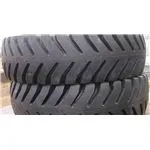The heavy duty trailer tires normally used are radial since these tires have superior strength and improved wear characteristics. These tires are extremely expensive, and need to be appropriately preserved by maintaining proper tire pressures and observing other necessary precautions.
Heavy Duty Trailer Tires Construction
The tire is essentially an assembly of several components built on
a strong drum and cured under heat and pressure in a press. Heat assists in the
polymerization process that creates stretched elastic molecules. The polymers
produce the elastic qualities that allow the tire to be compacted in the region
where the tire is in contact with the road. The tire attains its initial form
under high frequency cycles. All the heavy duty tires that are fitted on cargo
trailers, dump trailers, or small utility trailer are designed to be robust and
endure heavy loads.
Characteristics of Heavy Duty Tires
A heavy duty tire consists of ply cords that extend between the
bead segments. A bead-reinforced layer is laid in each bead section. The
carcass ply is wrapped around the bead core. The bead reinforced layer consists
of a coiled segment that extends along the base, and an outer part stretching
outwards. An inner portion also continues externally along the carcass ply. The
bead reinforced layer has ply cords that are laid side by side. When the
carcass ply is dragged outwards on tire inflation, or by external sidewall
deflection, the bead is exposed to rotational deformation about the central
axis. Consequently, the contact stress between the bead and the wheel rim is
increased. Therefore, this region is hardened unequally because of the
increased pressure and the heat generated. Thus, the heavy duty tires are
designed to prevent the local hardening, and avoid development of tire cracks,
to enhance the bead durability. The tires can be reused by suitable tire retreading,
to prevent the costs of purchasing a new tire. The heavy duty tires have an
aspect ratio in the range of 0.40 to 0.60.
Aspect ratio is an important characteristic of heavy duty tires that needs careful deliberations. It signifies the connection between the tire height and the tire width, when inflated on the correct tire rim. Aspect ratio is indicated in the tire section height, as a percentage of the tire section width, in two digit numbers like 80, 70, 60, 50, or 40.
These are normally signified as the tire series. The 50 mentioned on a tire indicates that the tire sidewall height is 50% of the tire section width. This relationship between the tire height and the tire width influences the tire shape, and its heavy duty performance. A tire that has a low aspect ratio will spread additional force from the uneven road and bumps, to the road surface. A tire with a high aspect ratio, will present a smooth ride because the sidewall flexibility permits easy tire deformation, and dissipation of the energy.

The OTR tire categorization include tires for the heavy construction trucks like heavy duty trailers, graders, backhoes, wheel loaders, large mining trucks, and trenchers. The OTR tires may be of the bias or radial category. However, the radial tires are becoming popular for such applications due to their superior characteristics, including durability, road grip, and reduced wear. The bias OTR tires are manufactured with a huge number of reinforced plies to endure severe road conditions and the heavy loads that are carried by such vehicles. The inner plies in the radial tires run sideways amid the beads.
This arrangement produces flexibility in the tires that decreases rolling resistance, and consequently improves fuel economy. The heavy duty radial tires are approximately 10 to 20% more economical in fuel compared to the bias tires. The improved flexibility in radial tires also assists to improve traction and turning. Thus, the tires can maintain firm tread contact during cornering. This permits a low tire aspect ratio, with short sidewalls that provide improved performance for truck handling.
